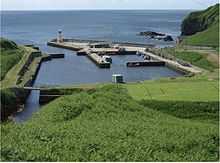Lybster
Coordinates: 58°18′N 3°17′W / 58.30°N 3.28°W
Lybster (Scottish Gaelic: Liabost) is a village on the east coast of Caithness in northern Scotland.

It was once a big herring fishing port, but has declined in recent years, due to problems in the industry.
It hosts the "World Championships of Knotty"; knotty or cnatag is a variant of shinty.
The film, The Silver Darlings, from Neil Gunn's book, was shot here.
Julian Bradford KGC OCL, the Laird of Glencairn, has a holding near Lybster.
The Sinclairs of Lybster have long roots running back to the Sinclair earls who ruled Caithness that was once a much larger area taking in much of Sutherland. Tracing further back the family has connections to the Norwegian earls who controlled the north of Scotland for centuries.
Lybster railway station was part of the Wick and Lybster Railway. It opened on 1 July 1903 and closed on 3 April 1944.
Lybster's sister city is Mackinac Island, U.S.A.
Patrick Sinclair: a famous Lybsterian
One of the more famous of the clan was Patrick Sinclair, who joined the Imperial Army and headed to the New World. He served in North America from 1759-1784 with the Black Watch and the 15th Regiment of Foot against the French and Indians and with the Royal Highland Emigrant Regiment during the American Revolution when he had the honourable post of Lieutenant-Governor of the post of Michilimackinac.
However, during the American Revolution, following some victories in the Ohio and Illinois territories, Patrick Sinclair felt it was necessary to move Fort Michilimackinac from its exposed location on the northernmost point of the lower peninsula of Michigan to Mackinac Island. As to not confuse the shipping lines the new fort and town would be renamed Fort Mackinac.
The construction began in 1779 and was completed in 1781. Patrick Sinclair ordered Michilimackinac razed to the ground to keep it out of the rebel American's hands and the move to Mackinac island was complete. The Officers Stone Quarters was not completed when Sinclair was called back to England to face a court martial for taking 'too many extravagancies' while building Fort Mackinac; he returned to Lybster in disgrace. The disgrace was later reversed and Sinclair was successively promoted in retirement from the rank of major to the rank of lieutenant-general. Sinclair was no longer on active duty and these promotions were bestowed for pension purposes.
Sinclair died in 1820 and was buried in Lybster. His grave is still there today as well as a plaque commemorating his command of Michilimackinac and the founding of Fort Mackinac.
Today there is a pub on Mackinac Island that bears his name. Ironically it is an Irish pub.
Patrick Sinclair quotes
"Persistence Wears Down Resistance."
"I can say in truth that I have not made a nickel here [at Michilimackinac]."
"It is managed by two men, one a scoundrel, the other an avaricious trader."
External links
 Media related to Lybster at Wikimedia Commons
Media related to Lybster at Wikimedia Commons- Biography at the Dictionary of Canadian Biography Online
- Lybster
